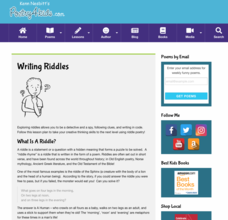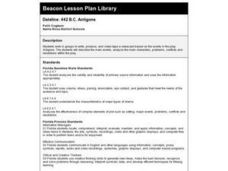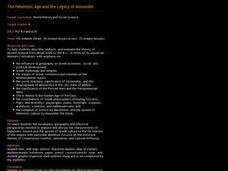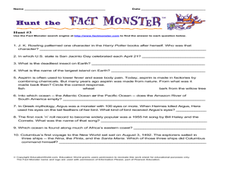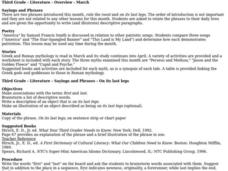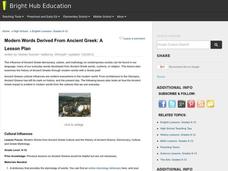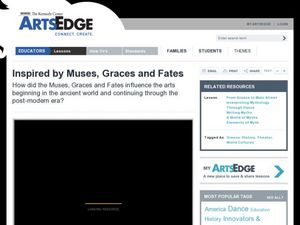Poetry4kids
Writing Riddles
What's got 60 eyes, 150 fingers, and an endless number of ideas? Your language arts class! Challenge young writers to come up with clever riddles with an online poetry lesson.
Curated OER
Dateline: 442 BC Antigone
Students create and videotape a newscast about the events that take place in the play, Antigone. They perform scenes describing the main events, the main characters and their conflicts.
Curated OER
A Modern Spin on Ancient Greece Using Percy Jackson
Rick Riordan's books provide a wonderful platform for the study of mythology.
Curated OER
Poseidon's Protectors to the Rescue
Students explore the concept of philanthropy. In this environmental stewardship lesson plan, students explore the Greek mythology story of Poseidon. Students write letters to Poseidon that address water pollution today and express how...
Gottlieb
Kennings vs. Stock Epithets – A Quick Review
Bone-crusher. Troll-wife. Battle-sweat. Blood-worm. What study of Beowulf would be complete without offering readers of this Old English epic poem an opportunity to craft their own kennings and epithets? Provide individuals with a copy...
Curated OER
The Helenistic Age and the Legacy of Alexander
Eighth graders describe, analyze and evaluate the history of ancient Greece from 2000 to 300 B.C. They explore the influence of geography on Greek economical, social, and political development.
Curated OER
Vivid Verbs in Writing
Eighth graders explore how to incorporate vivid verbs in their writing. They review action verbs in sentences and view a Power Point presentation discussing possible verbs and their meanings. They view a website and retell a Greek myth...
Curated OER
Hunt the Fact Monster: Hunt # 3
In this internet research worksheet, students search for facts via the Fact Monster website about J. K. Rowling, San Jacinto Day, Deadliest Insects on Earth, Aspirin, Amazon River, Greek Mythology, Bill Haley, Africa, and Columbus. They...
Curated OER
Literature
Third graders study phrases, poetry and myths of Ancient Greece and Rome in these lessons.
Curated OER
Sparta and Athens
Sixth graders study Ancient Greece. For this Ancient Greece lesson, 6th graders complete 16 lessons to learn about Ancient Greece. Students complete a quiz for assessment.
Curated OER
Ancient Greece
Students explore the origins of modern language. In this etymology lesson, students discuss the cultural influences of Ancient Greece on modern society. Students design and complete charts that demonstrate the original and contemporary...
Curated OER
Getting the Story
Students examine and discuss the basic elements of a newspaper article. They listen to articles, discuss the 'inverted pyramid' style of a breaking news article, and list imaginary current events based on mythological characters.
Curated OER
Being in the Noh: An Introduction to Japanese Noh Plays
Learners read a Japanese Noh play and discuss its structure and traditional characters. They choose a short myth and write a Noh play based on it.
Curated OER
Not Just for Gods and Goddesses:
Students use dictionaries, encyclopedias, art, computers, and books to study the Gods and Goddesses of Ancient Greece. In this Ancient Greece lesson plan, students research maps, stories, Olympic games, and more about Ancient Greece.
Curated OER
The Historical Development of Magnetism
Students discuss the history and importance of magnets to the world. In this magnetism lesson, students write an essay of a world without magnets. Students may research addition information to add details about uses of magnets.
Curated OER
Chile's Trapped Miners
Students read an article on trapped miners in Chile. In this social awareness ELL instructional activity, students read the details about how 33 miners had to be rescued in Chile when they got trapped underground. Activities that...
Curated OER
Inspired by Muses, Graces and Fates
Students examine how artists express the Muses through the arts. For this art and history lesson, students work cooperatively to identify the Greek Muses, Graces and the Fates. Students will identify the attributes of each, participate...
Newspaper in Education
The Iliad: A Young Reader Adventure
Is The Iliad part of your curriculum? Check out a resource that offers something for those new to teaching the classic and those with lots of experience using Homer's epic. Plot summaries, discussion questions, activities abound in...
American Museum of Natural History
Make Your Own Mythic Mask or Puppet
No need to wait until Halloween to create a mask. Young anthropologists get involved in the centuries-old tradition of mask and puppet making with the help of an engaging resource that shows them how to craft their own masks or puppets.
Curated OER
Review of Ancient Greece
Students create Greek gifts out of paper as a review for an upcoming quiz. They are to use a manila envelope to create what they felt was an important gift the Greeks gave. Once the gift has been created, it is placed into a big bag...
Curated OER
Classical Mythological Monsters
Students, after researching and analyzing ancient Greek and Roman mythological monsters, create a monster of their own similar to one they've researched or studied in their class syllabus. In addition, they present their creations to the...
Curated OER
Mapping Constellations
Students become familiar with constellations. In this space science lesson, the teacher introduces constellations by showing students the star patterns and reading myths. Students, observe the stars nightly, then choose one constellation...
Curated OER
"Building a Word Wall" Roots - The Foundation of Language
Students probe the impact of Greek and Latin on the English language in this ten lesson unit. Root words are analyzed for their origins and displayed on a word wall. Inventions are created using the words and placed in a class museum.
Curated OER
The Wilderness Concept: Our National Parks, History and Issues
Students examine the history of the National parks. In groups, they discuss the concepts of conservation and preservation. They discuss the use of natural resources and how some are renewable and non-renewable. To end the lesson plan,...


